Texas A&M CVM Honors Six Graduates As Outstanding Alumni
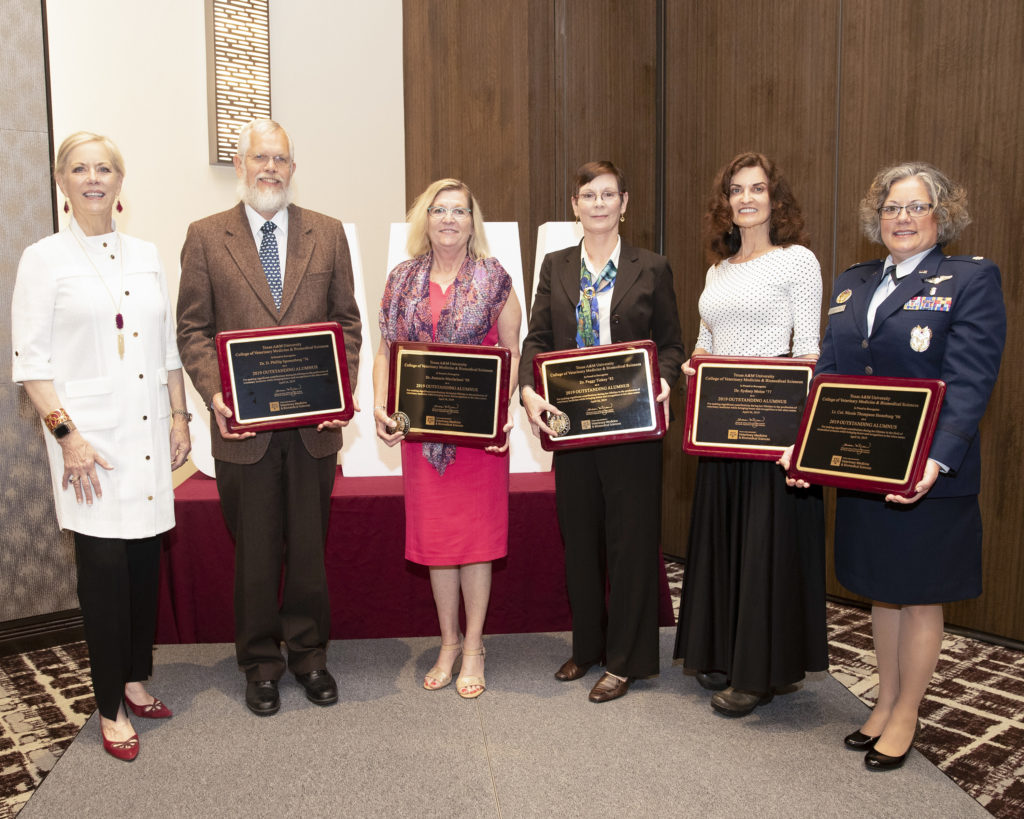
The Texas A&M College of Veterinary Medicine & Biomedical Sciences (CVM) recognized six alumni for their commitment, service, and leadership in the veterinary and biomedical sciences fields, as well as to their communities.
The annual Outstanding Alumni reception and dinner, held on April 26 at the Doug Pitcock ’49 Texas A&M Hotel & Conference Center, honored 2019 Outstanding Alumni Award winners Anmarie Macfarland, Sydney Moise, D. Phillip Sponenberg, Nicole Thompson Stoneburg, Peggy T. Tinkey, and Rising Star Award Winner Cassandra Tansey.
“We are honored and privileged to recognize our former students and the impact of their work on our college, our state, our nation, and the world,” said Dr. Eleanor M. Green, the Carl B. King dean of veterinary medicine. “These alumni are ambassadors for the CVM, and we are proud of their commitment to service, education, and leadership.”
Dr. Anmarie Macfarland ’90
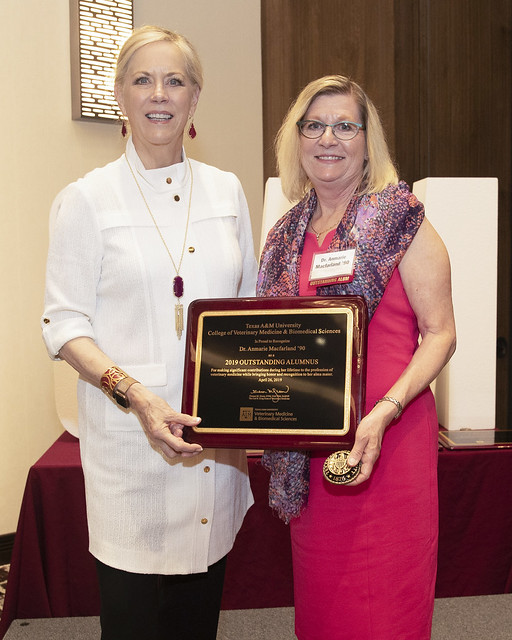
Dr. Anmarie Macfarland has devoted her career to both veterinary medicine and paving a path for women to lead in the field.
At the age of 10, Macfarland knew she was going to become a veterinarian, but, at that time, there were not many women in the profession to serve as role models for young girls.
Through hard work and determination, however, she realized her vision, graduating with biomedical sciences and Doctor of Veterinary Medicine degrees from Texas A&M.
Not long after beginning her professional career, several veterinarians with whom Macfarland worked saw her potential as a future leader.
Despite the fact that there were not many female veterinarians serving in professional leadership roles at that time, Macfarland, again, rose to the challenge, anticipating both the role she could play within organized veterinary medicine, but also the impact her leadership might have on other female veterinarians who came behind her.
In 2008, she became the third woman to serve as president of the Texas Veterinary Medical Association (TVMA) and in 2015 became the first woman president of the Southwest Veterinary Symposium’s (SWVS) Board of Managers.
“Dr. Macfarland was an excellent TVMA president. She is the type of executive committee member who was known by her ‘let’s roll up our sleeves and get to work’ attitude,” one nominator said. “Her presidency was defined by her work ethic; she took on the colossus task of reviewing the internal procedures of TVMA and assisted in the completion of rewriting the TVMA’s bylaws.”
In addition to her hard work and her reputation for service—garnered through years of committee membership and leadership in both TVMA and SWVS—she also developed a reputation for bringing people, and groups, together.
“I stand in awe of all the outstanding accomplishments of this great veterinary leader,” the nominator said. “I am impressed by her extreme work ethic for our profession, her ability to forge relationship between groups, and her outstanding reputation as a veterinary practitioner.”
During this time, Macfarland, a diplomate of the American Board of Veterinary Practitioners, worked as a partner at Loop 410 Veterinary Hospital in San Antonio, where she remains responsible for half of the caseload, mainly comprising of geriatric medicine and chronic disease management for dogs and cats, as well as wellness care.
For all of this work, she was recognized in 2017 as the TVMA Companion Animal Practitioner of the Year and as the recipient of the Southwest Veterinary Symposium Visionary Award.
“Dr. Macfarland has long been recognized as a progressive practitioner and leader in the field of veterinary medicine,” another nominator said. “She began working at Loop 410 Veterinary Hospital in 1984 while an undergraduate at Texas A&M. Even back then, I knew her future in veterinary medicine was bright because she was focused, had an exceptional work ethic for someone her age, an outstanding personality, and lots of enthusiasm.”
Dr. Sydney Moise ’77
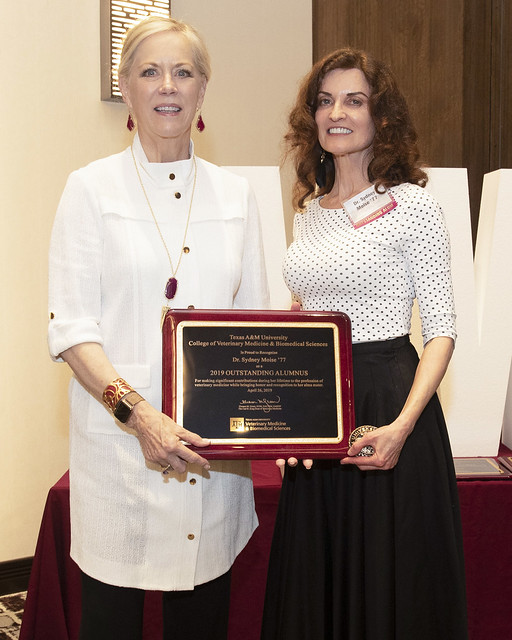
Dr. Sydney Moise has poured her heart into canine cardiology.
An internationally recognized scholar and educator who earned her bachelor’s and Doctor of Veterinary Medicine degrees from Texas A&M, Moise has devoted her career to cardiac rhythms and cardiovascular defects in dogs.
For more than 30 years, she has served at Cornell University, now as a professor of medicine in its College of Veterinary Medicine and an affiliated bioengineering faculty member in its bioengineering program.
She has received more than a million dollars in funding to study canine ventricular arrhythmias, sinus node dysfunction, the mechanisms of degeneration of the mitral valve, and the patterning and beat-to- beat heart rate variability of normal and abnormal rhythms.
“Dr. Moise’s accomplishments, since joining the Cornell faculty in the mid- 1980s, deserve special acknowledgement. She is talented in all aspects of clinical cardiology and is responsible for the development of interventional cardiology and echocardiography at the Cornell University CVM over the past 30 years,” one nominator said. “She is world-renowned for her expertise in electrocardiology and is one of the few veterinary cardiologists who have championed the utility of electrophysiology in clinical practice.
“In fact, Dr. Moise is one of the few veterinarians to have contributed meaningfully to discovering mechanisms of naturally occurring, lethal arrhythmias affecting dogs, the molecular basis of rhythm disturbances, and development of clinical applications for arrhythmia management,” the nominator continued.
“She learns continuously from each clinical case and uses that knowledge to improve compassionate care for each pet,” one nominator said. “(And) Many of her research studies are directly relevant to electrophysiologic characteristics of the same arrhythmias in humans.”
As a scholar, Moise has published more than 100 peer-reviewed articles and book chapters, has served as an editor-in-chief and associate editor for the international Journal of Veterinary Cardiology, and has given presentations around the world, including in the United Arab Republic, Europe, Thailand, Brazil, China, and Russia, among many others.
For her work, she has been awarded the American Veterinary Medical Association research award for arrhythmia studies and the Bourgelat Award for international contribution to the clinical practice of veterinary medicine.
In addition, Moise is a beloved mentor and educator, having received the Norden Teaching Award, presented by the Association of American Veterinary Medical Colleges for distinguished teaching.
“Sydney possesses a highly scientific mind that allows her to analyze in detail the complex natural phenomena concretizing them with diagnostic methods for all the levels of knowledge,” another nominator said. “She is a fantastic human being, full of initiative and able to motivate people to human and professional growth.”
Dr. D. Phillip Sponenberg ’76
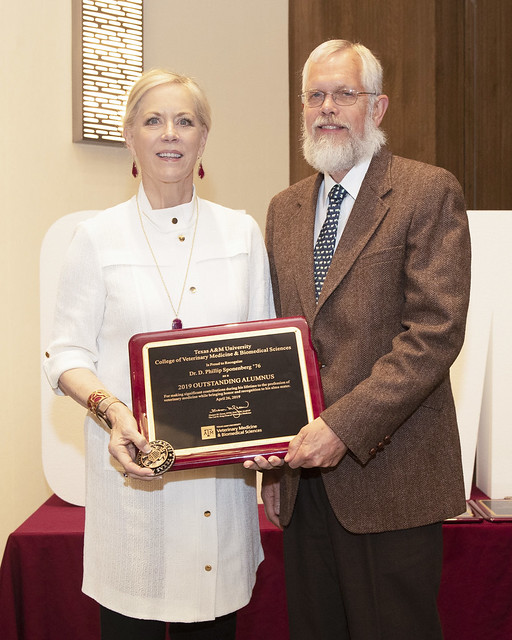
The words “rare” and Dr. Phillip Sponenberg go hand-in-hand, both in describing him as a person and his academic focus on conservation.
Sponenberg, a professor in Virginia Tech’s Virginia-Maryland College of Veterinary Medicine’s (VMCVM) Department of Pathobiology, earned his bachelor’s and Doctor of Veterinary Medicine degrees at Texas A&M before completing his Doctor of Philosophy in veterinary medicine from Cornell University.
Even as an undergraduate, he stood out among his peers, according to one nominator.
“During our conversations, it became readily apparent that Phil was very bright and had already thoughtfully envisioned his veterinary career focused on reproductive pathology and conservation genetics of domestic animals; in particular, he was intrigued by the genetics of equine hair coat color,” the nominator said. “Subsequently, Dr. Sponenberg fulfilled that vision with a long and exceptionally distinguished professional career in research, teaching and service.”
That distinguished career at VMCVM, which began in 1981, has been marked by his being the youngest faculty member to have been promoted to the rank of full professor and by his serious commitment to service across all dimensions of academic activity.
“Phil’s academic career has been a relatively even mix of research, service, and teaching. This is a mix that is becoming increasingly rare as faculty are currently hired to emphasize mostly one of these missions,” another nominator said. “He has received recognition for excellence in all three of these missions.”
While his teaching efforts include decades of instruction in pathology, reproduction, necropsy and veterinary genetics—making positive impacts on hundreds of veterinary students—his service to his students and field span performing advisory roles for student groups, as well as a host of university and association advisory and service committees.
“As superb as Phil’s teaching and service are, his work in international and national conservation genetics and livestock breeds conservation eclipse those career accomplishments,” the nominator said.
Within his academic interests—which include reproductive pathology, conservation principles, conservation genetics, and coat color—he has produced 431 publications for the lay public, 109 scientific journal articles, 13 major books, 31 book chapters, and 174 invited presentations for breed associations.
“Phil’s contributions to the conservation of livestock genetic resources have filled a void in the United States, where he is a leader in this effort to assure a secure and viable future for food production,” a nominator said. “He is unique among academicians in North America with this interest and with his long contributions to this area.”
For these efforts, Sponenberg has been recognized extensively at VMCVM, including the Teaching Hospital Lifetime Service Award and Excellence in Outreach Award; as the Virginia Veterinary Medical Association’s 2017 Distinguished Virginia Veterinarian; and as an honorary member of the American College of Theriogenology, among many others.
“Clearly, Professor Sponenberg has left his indelible mark on the future world-wide conservation of domestic animal species,” a nominator said.
Lt. Col. Nicole Thompson Stoneburg ’96
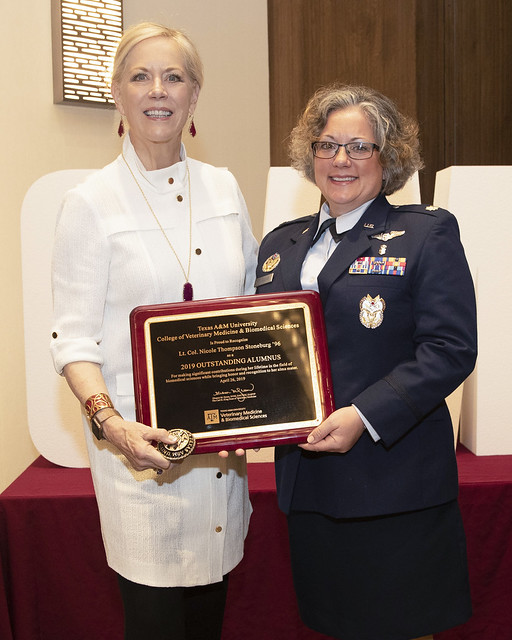
Lt. Col. Nicole Thompson Stoneburg has dedicated her life to the U.S. Air Force and the health of our nation through deployment, disaster response, and daily military nursing needs.
A Texas A&M biomedical sciences graduate, Stoneburg has always had a strong desire to help others. She began her nursing career in 1998 at Houston’s Herman Memorial Children’s Hospital; in 1999, she was compelled to serve her country by joining the U.S. Air Force, serving first as a clinical nurse for the U.S. Air Force Academy before moving up the ranks to her current position as Inspector General for the 11th Wing at Joint Base Andrews, Maryland.
With years of leadership experience, Stoneburg now oversees the daily operations for the 11th Wing Inspection and Complaints departments. She puts great emphasis on resolving complaints, protecting the rights of all personnel, and ensuring the members of the 11th Wing are ready to execute both in-garrison and deployed missions.
“Lt. Col. Nicole Stoneburg is a superb military officer, skilled medical professional, distinguished combat veteran, and a top-tier leader,” one nominator said. “She is demonstrating the powerful combination of hard work, initiative, adherence to values, and a superb educational foundation.”
Stoneburg showed bravery and leadership directing crews in providing life-saving medical care while deployed to Iraq and Afghanistan, as well as while serving in New Orleans after Hurricane Katrina.
“Nicole is always ready to save lives and care for those in need,” another nominator said. “She has continually distinguished herself as a leader and innovator as she made positive differences in the lives of thousands across the world.”
In addition to her nursing experience, Stoneburg has taken charge on several initiatives to standardize military medical care and evidence collection to ensure the best treatment for sexual assault victims.
In 2012, Stoneburg was one of 23 Air Force officers, and the only Air Force nurse, to be selected to serve as a legislative fellow in the U.S. Congress and military advisor to former California Sen. Barbara Boxer.
“As a Congressional Fellow, Nicole drafted legislation to improve military medical treatment for victims of sexual assault,” a nominator said. “Later signed into law as part of the Fiscal Year 2015 National Defense Authorization Act, her tenacious efforts have improved treatment for sexual assault victims across the entire Department of Defense.”
A parent herself, Stoneburg has also dedicated much of her life to improving child care at the Child Development Centers at Joint Base Andrews. She has volunteered hundreds of hours to teach emergency child medicine and serve on the Parent Advisory Council.
Throughout the years, Stoneburg has earned many awards and medals, including the Air Medal, Air Force Achievement Medal, the Meritorious Service Medal, and the Flight Nurse Instructor of the Year Award.
“The foundation of being an excellent nurse is a fundamental care and understanding of people’s needs in hopes to make their lives better,” one nominator said. “She has continually exemplified those traits and proven her desire to use her skills to improve her patients’ health and the nursing field.”
Dr. Peggy Tinkey ’83
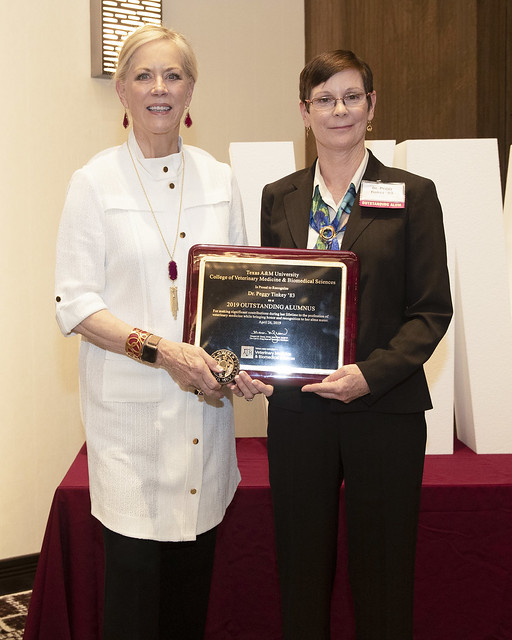
While Dr. Peggy Tinkey was an accomplished private practice veterinarian for many years, her decision to join the University of Texas MD Anderson Cancer Center allowed her to truly impact the efforts to “Make Cancer History.”
Retiring in January, Tinkey served at MD Anderson for 25 years as a professor, and eventually chair, in the MD Anderson Department of Veterinary Medicine and Surgery’s Division of Basic Science Research.
In this role, she served as a valued resource for technique development and administration of the animal care and use program for the research community, which included 10 faculty
veterinarians and 148 staff and also oversaw a budget of more than $14 million in support of the research activities of more than 300 principal investigators.
“Dr. Tinkey is an outstanding leader who has directed a very large animal care program at one of the largest academic medical centers in the country,” one nominator said. “In her role as the attending veterinarian at MD Anderson, she has represented veterinary medicine in a very complex academic research environment, and she directed an animal care program that is viewed as exemplary by her veterinary colleagues across the country.”
Her work with the Association for Assessment and Accreditation of Laboratory Animal Care (AAALAC) International also has helped raise the standard of veterinary care at institutions across the United States and in other countries.
“Through her service on (AAALAC) Council on Accreditation, Dr. Tinkey has positively impacted the welfare of thousands of animals of diverse species,” a nominator said. “She embraces the principle of providing a high standard of professional leadership through active service, both within her own institution and the broader community. She clearly has a heart for service to the scientific community and the welfare of animals.”
Tinkey’s passion for, and long track record of, sharing her knowledge and love of medicine led her to play an instrumental role in the development of the Gulf Coast Consortium (GCC) Veterinary Clinical Residency in Laboratory Animal Medicine—a collaborative endeavor between MD Anderson, Baylor College of Medicine, and UTHealth–which went on to successfully win a $500,000 National Institutes of Health R25 veterinary training grant that provided funding for a three-year veterinary residency program for three residents.
She also co-edited the book “Patient Derived Tumor Xenograft Models: Promise, Potential and Practice,” which presents the results of the first ever global survey on standards of patient derived xenograft development and usage in academia and industry.
Her dedication to educating the next generation of doctors led to her return to her alma mater, Texas A&M—from which she earned bachelor’s and her Doctor of Veterinary Medicine degrees—to serve a dual appointment as an associate professor in the College of Medicine’s Department of Pathology.
“One of her greatest attributes is her ability to mentor colleagues in the research field,” a nominator said. “Through all her years of practice, animal welfare has been her top priority, with human welfare a close second.”
Dr. Cassandra Tansey ’15 (awarded in absentia)
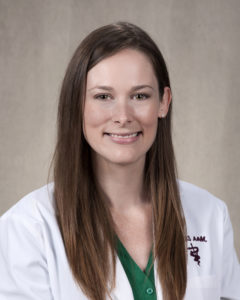
As a senior clinical veterinarian for the Centers for Disease Control and Prevention (CDC), Dr. Cassandra Tansey works to ensure both humans and animals are safe from zoonotic diseases.
Working at the CDC since she completed her Doctor of Veterinary Medicine degree at Texas A&M, Tansey now serves as an expert on global zoonotic disease surveillance and epidemiology and oversees the CDC’s veterinary medicine clinical care program, among other responsibilities.
“I continue to be impressed by her work ethic, thoughtfulness, and ambition,” one nominator said. “She frequently assists scientific investigators in our High Containment Laboratory, a remarkable accomplishment in gaining researchers’ trust in an environment where small accidents can become life-threatening.”
As a primary responder for the CDC’s Global Rapid Response Team— designed to increase the CDC’s capacity to respond to global health threats— Tansey served as the CDC Emergency Operations Center epidemiologist during the Zika virus outbreak and was one of the first veterinarians deployed during the Seoul Hantavirus outbreak that affected 17 people in 11 midwestern states.
“This (Seoul Hantavirus) outbreak was especially challenging due to the coordination required with local and state health departments and the huge amount of public education and communication necessary,” another nominator said. “Dr. Tansey’s actions, along with other key staff members, provided valuable information necessary to address this potential public health concern.”
In her scholarly pursuits, Tansey has accrued four publications and 11 professional presentations, including contributing to the sixth edition of the Biosafety in Microbiological and Biomedical Laboratories, which serves as a cornerstone of world-wide biosafety practice and policy.
In the midst of all of this, Tansey has remained steadfast in her commitment to service on a number of national and international committees; as a World Veterinary Association (WVA) Councilor for North America, she is leading the effort to develop a policy statement on the role of veterinarians in food security that will likely be adopted this year.
She also serves as a mentor to students rotating through their program, gives tours to local students visiting the CDC, and is a Girl Scout troop leader.
“Last year, her troop engaged in a service project for sustainability and successfully encouraged restaurants in the greater Atlanta area to reduce their use of plastic,” another nominator said. “Her involvement with the Girl Scouts will assuredly foster a love of the STEM disciplines in these young women. I would not be at all surprised to see a Girl Scout troop member follow the model that Cassandra has set.”
All of these accomplishments have led Tansey to receive three CDC recognitions, including the National Center for Emerging and Zoonotic Infectious Diseases Director’s Recognition Award and Honor Award Certificate, as well as the Office of the Director’s Certificate of Appreciation.
“Dr. Tansey has distinguished herself as an extremely capable leader, superb clinician, experienced biocontainment manager, and a very dedicated and resourceful mentor,” a nominator said. “Her knowledge base, management capabilities, and leadership skills are second to none.
###
For more information about the Texas A&M College of Veterinary Medicine & Biomedical Sciences, please visit our website at vetmed.tamu.edu or join us on Facebook, Instagram, and Twitter.
Contact Information: Jennifer Gauntt, Interim Director of CVM Communications, Texas A&M College of Veterinary Medicine & Biomedical Science; jgauntt@cvm.tamu.edu; 979-862-4216


